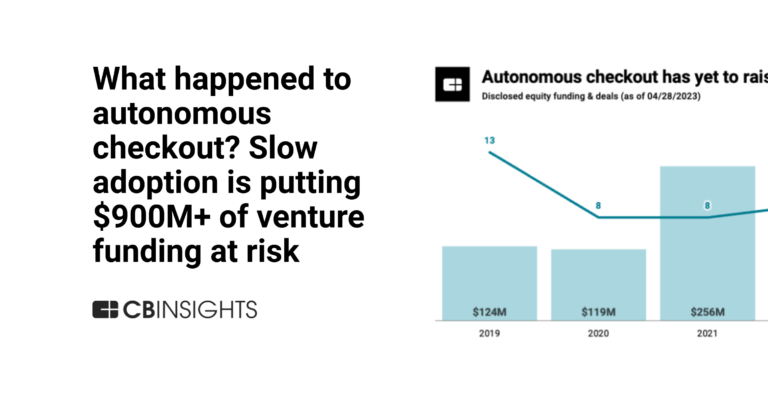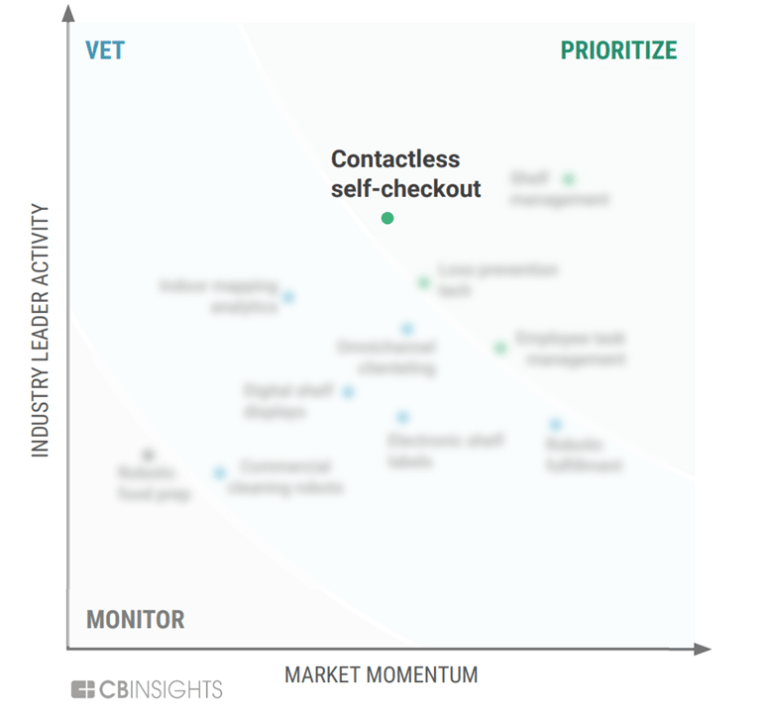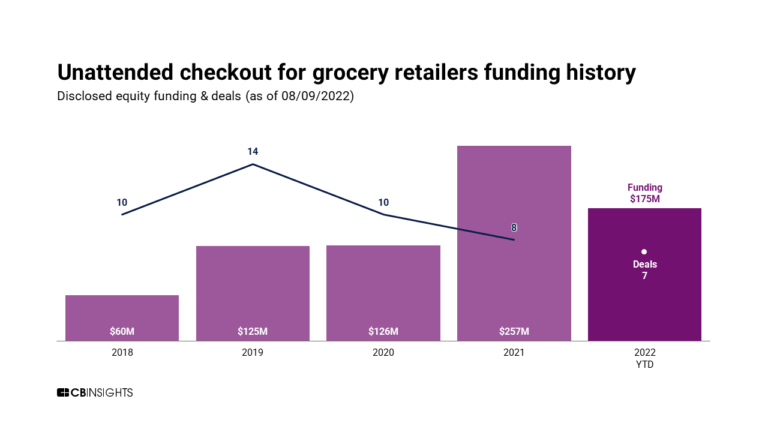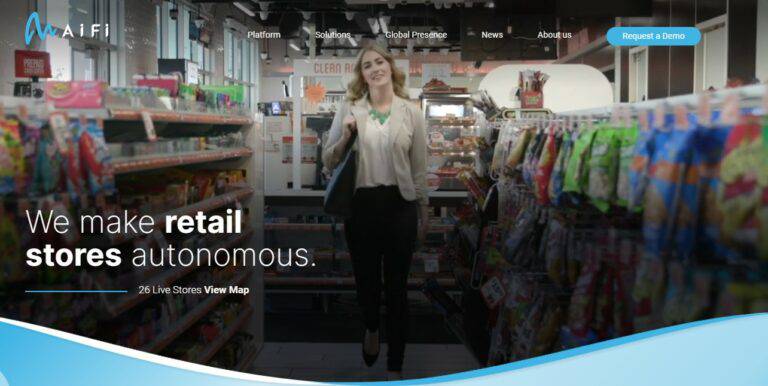
Standard AI
Founded Year
2017Stage
Unattributed VC - II | AliveTotal Raised
$236.32MMosaic Score The Mosaic Score is an algorithm that measures the overall financial health and market potential of private companies.
-121 points in the past 30 days
About Standard AI
Standard AI operates as a company focused on transforming the retail industry through artificial intelligence. The company offers a platform that uses artificial intelligence (AI)-powered cameras and deep algorithms to provide checkout-free shopping experiences, real-time reporting on shopper behavior, and insights into inventory and stocks. Its primary services are utilized in the retail sector. It was founded in 2017 and is based in San Francisco, California.
Loading...
ESPs containing Standard AI
The ESP matrix leverages data and analyst insight to identify and rank leading companies in a given technology landscape.
The unattended checkout market offers a range of solutions to retailers looking to provide unmanned point-of-sale and checkout technology. Solutions involve the deployment of kiosks, mobile applications, and computer vision technology to facilitate a seamless and contactless checkout experience for customers. This market is driven by the increasing demand for convenient and efficient shopping expe…
Standard AI named as Challenger among 15 other companies, including Amazon, AiFi, and MishiPay.
Standard AI's Products & Differentiators
Self-Checkout
Standard AI acquired Skip, the world leader in self checkout. The acquisition enables them to provide customers with self-checkout kiosks and cloud-based POS and integrations
Loading...
Research containing Standard AI
Get data-driven expert analysis from the CB Insights Intelligence Unit.
CB Insights Intelligence Analysts have mentioned Standard AI in 5 CB Insights research briefs, most recently on May 3, 2023.


Feb 2, 2022 report
Why Retail Leaders Are Prioritizing Contactless Self-CheckoutExpert Collections containing Standard AI
Expert Collections are analyst-curated lists that highlight the companies you need to know in the most important technology spaces.
Standard AI is included in 11 Expert Collections, including Store tech (In-store retail tech).
Store tech (In-store retail tech)
2,063 items
Companies that make tech solutions to enable brick-and-mortar retail store operations.
Unicorns- Billion Dollar Startups
1,244 items
Grocery Retail Tech
831 items
Startups providing B2B solutions to grocery businesses to improve their store and omni-channel performance. Includes customer analytics platforms, in-store robots, predictive inventory management systems, online enablement for grocers and consumables retailers, and more.
Payments
3,034 items
Companies in this collection provide technology that enables consumers and businesses to pay, collect, automate, and settle transfers of currency, both online and at the physical point-of-sale.
Future Unicorns 2019
50 items
Artificial Intelligence
14,769 items
Companies developing artificial intelligence solutions, including cross-industry applications, industry-specific products, and AI infrastructure solutions.
Standard AI Patents
Standard AI has filed 108 patents.
The 3 most popular patent topics include:
- machine learning
- artificial neural networks
- artificial intelligence

Application Date | Grant Date | Title | Related Topics | Status |
|---|---|---|---|---|
5/10/2022 | 9/3/2024 | Artificial neural networks, Machine learning, Classification algorithms, Artificial intelligence, Computer vision | Grant |
Application Date | 5/10/2022 |
|---|---|
Grant Date | 9/3/2024 |
Title | |
Related Topics | Artificial neural networks, Machine learning, Classification algorithms, Artificial intelligence, Computer vision |
Status | Grant |
Latest Standard AI News
Sep 17, 2024
Now, with the September introduction of the iPhone 16, it’s clear that Apple’s most advanced smartphone to date will bring the hardware capable of powering advanced experiences. “The iPhone’s new AI chipset is unlocking endless possibilities to how retail customers will be able to leverage new AI search using their phone — now and in the future as the technology advances,” said Angie Westbrock, chief executive officer of Standard AI, a Bay Area-based company that develops data-driven tools to help retailers in areas such as marketing, loss prevention and supply chains. Westbrock is particularly excited about AI capabilities for vision-based retail experiences — both online and off. “In stores, these advancements will unlock the next generation of hyper-personalization, combined with image analysis, which will enable applications like product recognition and the ability to tie together in-store experiences with more traditional app-based e-commerce,” she said. Not that Apple is breaking new ground. In fact, it’s something of a latecomer to AI, a battlefield already filled with giants like Google, Microsoft, Meta, Amazon and more. That’s typical of Apple, though. It has earned a reputation for taking up new technologies slowly, refining them and then creating demand that reshapes mainstream behavior. Take the arrival of the iPhone itself in 2007. It wasn’t the first smartphone, but it was the first to inspire blocks-long lines in front of Apple Stores, and it set off a fierce rivalry with Google. These events, which pushed mobile web development and the advent of app stores, birthed the advent of mobile commerce — which, it turns out, is still growing. According to e-commerce data analytics firm ECDB, mobile devices are expected to drive the majority of online sales this holiday season, at 53 percent, with personal care and apparel following groceries as the top categories. Phones will account for 68 percent to 77 percent of those collective sales. How much of that will be driven by Apple’s AI updates remains to be seen, at least over the next few months. But in terms of long-term influence on beauty or fashion commerce, the experts seem bullish. “Siri already handles the basics like telling you the time or reminding you of your tasks, but imagine if Siri could tell you it’s time to reorder your favorite beauty products because the new iPhone AI tracks how often you buy items like moisturizer or mascara, based on usage and frequency,” said Anjee Solanki, national director of retail services and practice groups in the U.S. for investment management firm Colliers. “Soon we’ll all be relying on our iPhones for everything they can offer in the world of beauty,” she added. What’s important to realize is that the iPhone 16, and the iOS 18 software powering it, are just the beginning, not the end of Apple’s AI bid — especially in an intensely competitive ring with Google. Android devices have been feasting on a steady diet of computer vision, generative AI, natural language capabilities and features like circle to search, among others. In the face of that, Apple’s continued development seems assured. This is what has Westbrock excited, and fashion should be as well. Because the sector may finally see AI deliver on some specific promises. “Already, I’m picturing how future APIs for vision capabilities like image segmentation and visual classification will reinvent our in-person and e-commerce shopping experiences,” she said. “Imagine applications, like taking an image of a pair of jeans while out and using AI to help you find it online in your size.” Other areas on her radar are styling and image-based search, with in-store customers seeing a garment and snapping a photo to view other options. Scenarios like that would bridge online and offline worlds, she said, and not just for shoppers, but for the retailers too. This is where companies like Standard AI come in. The firm’s AI platform analyzes data and gives retailers a precise view of shopper behavior, product interactions and store dynamics, like real-time data on low-stock or out-of-stock products. “[With our] ability to understand shopper behaviors and the customer journey through the physical store, the iPhone’s AI updates can bring an advanced level of personalization to in-store recommendations and marketing, all while maintaining shopper privacy,” said Westbrock, with Apple’s focus on privacy adding to the equation. For now, it appears that retail has a few things to look forward to, whether they boost this holiday season or the next. Tags
Standard AI Frequently Asked Questions (FAQ)
When was Standard AI founded?
Standard AI was founded in 2017.
Where is Standard AI's headquarters?
Standard AI's headquarters is located at 548 Market Street, San Francisco.
What is Standard AI's latest funding round?
Standard AI's latest funding round is Unattributed VC - II.
How much did Standard AI raise?
Standard AI raised a total of $236.32M.
Who are the investors of Standard AI?
Investors of Standard AI include Sergey Gordeev, Liquid 2 Ventures, CRV, Initialized Capital, EQT Ventures and 12 more.
Who are Standard AI's competitors?
Competitors of Standard AI include AiFi, Fainders.ai, PIXEVIA, Qidianyun, Trigo and 7 more.
What products does Standard AI offer?
Standard AI's products include Self-Checkout and 4 more.
Loading...
Compare Standard AI to Competitors

Trigo provides a computer vision company operating in retail. It provides a retail automation platform that uses artificial intelligence to identify shopping items with high accuracy, enabling a seamless checkout process and providing valuable retail insights. It provides EasyOut for customer shopping and related services. It primarily sells to the grocery retail industry. Trigo was formerly known as Trigo Vision. It was founded in 2018 and is based in Ramat Gan, Israel.

AiFi specializes in autonomous retail technology and operates within the retail and technology sectors. The company offers computer vision solutions that enable retailers to implement frictionless shopping experiences without needing shelf sensors. It primarily sells to the retail industry, providing advanced analytics and AI-powered checkout systems to enhance the shopping experience. The company was founded in 2016 and is based in Burlingame, California.

Zippin specializes in checkout-free technology within the retail sector. The company provides an artificial intelligence-powered platform that uses machine learning and sensor fusion technology to enable purchases. It is primarily utilized by sports and entertainment venues, airports, train stations, convenience stores, college campuses, and healthcare organizations. Zippin was formerly known as Zyp. It was founded in 2018 and is based in San Francisco, California.

Grabango is a provider of checkout-free technology for the retail sector, focusing on enhancing the shopping experience in grocery and convenience stores. The company offers a solution that allows customers to shop without waiting in checkout lines by using a mobile application to scan a code and automatically tally their items. Grabango's technology is designed for large-scale store chains and aims to save shoppers time by streamlining the purchasing process. It was founded in 2016 and is based in Berkeley, California.
Inokyo specializes in autonomous checkout technology for the retail sector, aiming to streamline the shopping experience. Their main offerings include a system that tracks customers' virtual carts in real-time and allows for tap and go payments, eliminating the need for traditional checkout processes. Inokyo's solutions cater to a variety of store sizes and are designed to improve operational efficiency and provide valuable customer insights. It was founded in 2018 and is based in San Francisco, California.

Boxy is a company focused on disrupting the self-service commerce industry by providing smart, autonomous modules. Their main offerings include smart refrigerated modules and furniture that enable the sale of food and non-food products around the clock. Boxy's solutions cater to a variety of sectors including hotels, gyms, airports, and corporate offices. Boxy was formerly known as Storelift. It was founded in 2018 and is based in Paris, France.
Loading...


